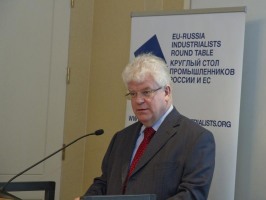Dear Mr.Fleckenstein,
Dear Mr. Kredler,
Ladies and gentlemen,
Dear colleagues,
First of all let me thank the management of the Russia-EU Industrialists’ Round Table (IRT) for the opportunity to address to this distinguished audience. The Permanent Mission of Russia to the EU acknowledges and highly appreciates IRT’s contribution to the development of cooperation between Russia and the EU and renders its political and practical support to your organisation’s initiatives.
Let me in my brief welcome address dwell on the present state of trade and economic relations between Russia and the EU.
Russia and the European Union mutually regard each other as strategic partners. And this is not an abstract political slogan, but rather a term with a tangible practical connotation. According to Russian customs statistics, in 2010 the EU accounted for about 53 per cent of Russian merchandise exports and 42 per cent of its imports. And those shares have over a number of years remained practically stable. About 70 per cent of the foreign direct investment stocks in Russia are accounted for by EU member countries.
In turn, Russia is third (after the U.S. and China) on the list of exporters to the European Union and fourth among its importers. Russia is the leading supplier to the EU of natural gas and holds the second position in its imports of crude oil and petroleum products. Accordingly, trade and economic relations with the European Union constitute one of the major directions of Russia’s foreign economic activities. It is the European vector which determines the priorities of our country in foreign trade and plays a significant role in expanding Russia’s international cooperation in the investment area. We proceed from the fact that interaction with the EU may well contribute to promoting a policy aimed at modernizing and diversifying the Russian economy.
After a considerable drop in the volume of trade in 2009 due to the global financial and economic crisis, in the year 2010 we observed a noticeable recovery effect. The trade turnover between Russia and the EU increased by 32 per cent and exceeded €240 billion. It should also be noted that the rates of growth of both exports and imports were about equal.
Since the beginning of the current year indicators of mutual trade turnover have continued to improve. The numbers speak for themselves: for the first four months of 2011 the mutual Russia – EU trade turnover increased by 35 per cent (year on year) and amounted to almost 100 billion euros.
These figures testify clearly to the fact that Russia and the EU are determined to develop further their trade, as well as accelerate economic convergence. The need to create a Common Economic Space between Russia and the EU is dictated by the realities of present-day economy.
Indeed, trade is much more than just statistics, and economic ties are much more than just trade.
Since the inception of the relevant Roadmap back in 2005 this process has been developing along several tracks. During the Russia-EU summit in Rostov-on-Don in June 2010 the “Partnership for Modernisation” initiative was launched. The initiative is called upon to assist both Russia and the EU in providing answers to common challenges of the contemporary world to the mutual benefit of their citizens. In a joint statement of the summit on this issue the leaders of Russia and the EU noted that in a world where peoples and economies are ever more connected and interdependent, modernising our economies and societies becomes ever more important and necessary.
In its documents the European Union defines as key aims the tasks which are very similar to those put forward by the Russian leadership. These are developing an economy based on knowledge and innovations, promoting sustainable growth of the economy, fostering a socially-oriented model that provides for the maximum employment and reduction of the level of poverty. It is no secret that Russia faces the same challenges and is addressing the same problems.
Having said this, it is obvious – and world-wide experience confirms this thesis – that it would be naïve to sit idle waiting for a possibility to blindly import modernisation recipes from abroad. In our view, the “Partnership for Modernisation” initiative is an important addition contributing to serious internal work undertaken in this direction. It cannot replace own efforts either by Russia, or the European Union, but thanks to a synergy of efforts may substantially increase their effectiveness along this track.
In general, we consider that in a polycentric world an effective international architecture can only be created if it rests on solid regional "building blocks". The strengthening of the regional level of global governance and the increase in influence of regional organisations is an essential feature of the present-day stage of development of international relations. It is with these considerations in mind that we regard integration unions that are emerging within the CIS space, including the Customs Union between Russia, Belarus and Kazakhstan. The same assumption is valid with regard to the forthcoming Single Economic Space to be launched on 1 January 2012 with a further perspective of forming the Eurasian Union.
I would like to remind you that, as has been stated in the Russia-EU Roadmap for the Common space of cooperation in external security, integration processes within the CIS space, as well as the European integration process, are mutually complementary. Thus, it is our relevant task to find the “golden link” while moving forward towards the Common Economic Space between Russia and the EU, as well as creating the Single Economic Space within the CIS. From the Russian standpoint we do believe that finding such a balance is quite feasible.
Let me finally wish to the participants of this workshop fruitful discussions and every success.
Thank you.























